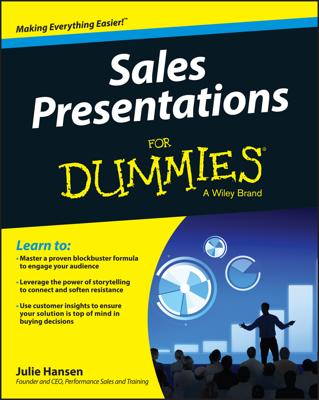A rejection word is any word that triggers fear or reminds prospects that you’re trying to sell them something. Rejection words scare your prospects so much that most of them will reject you and your product or service. Before you even realize what’s happened, the possibilities of a successful close shrivel up and die right in front of you. If you don’t control rejection words, the only close you’ll experience is the door in your face as your prospective customers make a quick exit.
Each of the following sections lists a word or phrase that you need to immediately drop from your selling vocabulary if you want to be a master closer. Instead, , use more positive words to replace the rejection words, along with some sample dialogue to show the positive words in action.
Objection
Objection is yesterday’s word. Today’s objections are referred to as concerns or areas of concern, both of which are softer terms than objection. An objection is like throwing down the gauntlet. It presents too antagonistic an image. A concern may sidetrack the main theme of conversation for a bit, but it doesn’t halt progress the way an objection does. The client is concerned, so you’re concerned and you commit to addressing that concern.
Here’s an example of how to replace the rejection word objection with the more positive word concern:
I understand your concern about that point; with your permission, I’d like to make a note of it, and we’ll cover it at the end of my presentation.
Cheaper
Never let customers hear the word cheaper. Not many people really want cheap goods or services in the context of cheap meaning less than. Referring to your product or service as more economical creates a more positive impression. It’s a wise thing to be economical. Case in point:
Not only is our product of the highest quality, but it’s much more economical than most brand-name models.
Customer
Customer is a difficult word to stop using when you’re with your clients. After all, customer is a word you commonly use in private conversations with fellow salespeople. However, the word customer creates an impersonal categorization of people. Why risk having a potential new client feel that he’ll become just one of hundreds of others in a statistic?
Serving others is really what selling is all about. The best way to stop using the word customer is to think of the customer as someone you’re serving. So why not replace customer with serve? For example:
Did you realize that we serve over 25 families in this neighborhood already?
Lookers
Your clients are never just lookers; they’re researchers. For example, if a young couple came into a furniture store, a professional salesperson would approach them as if they were researching what living room set would look best in their new home — not as if they were there just to look around. Here’s an example:
Thanks for coming in today. Let me ask you, are you candidates for new furniture today, or are you just researching your options?
If you assume or even risk asking if people are just looking, you allow them to have that mind-set. Your goal should be to have them develop an ownership mentality. They have a need to be fulfilled and are conducting research to find the right person or company to serve them.
Have to
As a salesperson, never make your customers feel as though you’re there because you have to be. They’ll feel better (and less pressured) knowing you’re happy to be there serving them. For example, instead of saying something like, I’ll have to go see if we have any in stock, say:
I’ll be happy to check our inventory on that item for you. Please give me just a moment.
Prospects
Although the word prospects has been a favorite for a long time, today it’s more appropriate to refer to prospects as future clients. Referring to prospects as future clients is a form of assumptive closing that, when used properly (and with sincerity), demonstrates your confidence in your ability to meet the clients’ needs and become their new supplier. For example:
As a future client, do you have any questions for me? I’d also like to take this opportunity to ask you a few questions and take some notes on your responses so I can help you determine exactly what you require in this product.


